This article may contain affiliate/compensated links. For full information, please see our disclaimer here.
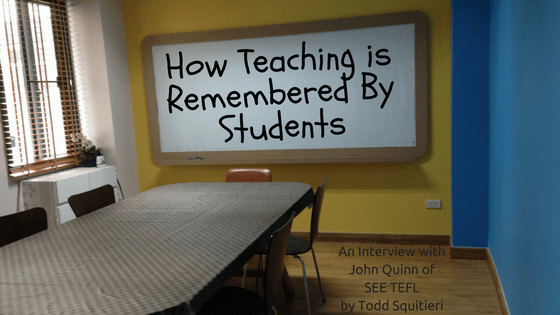
This is a guest post from Todd Squitieri, a teacher currently living in Chiang Mai, Thailand. Todd spent time speaking with veteran instructor and entrepreneur John Quinn, who runs a Teaching English as a Foreign Language (TEFL) school in Chiang Mai to learn from his decades of experience teaching both students and teachers.
John shared interesting insights about what it takes to be an effective and memorable English teacher, what it was like to travel in Asia decades before technology and smartphones, and how teaching English in Thailand has changed over the years until today.
How Teaching is Remembered By Students
I walked up the promenade that was surrounded by a gorgeous crimson-red fence. The school looked almost like a sacred temple, nearly blending in with the other intricate trellises around it. I was going to SEE TEFL school in Chiang Mai, which is owned by a veteran instructor and entrepreneur, John Quinn. For those of you who may have experience in teaching English in Thailand or familiarity with the English as a Foreign Language (EFL) industry, you’ll probably have seen John’s name come up a number of times and this is no accident.

SEE’s new building in Chiang Mai, Thailand.
John Quinn has been running his school and teacher-training academy for at least a decade and if you just visited the facility, you probably wouldn’t be able to see any sign of the journey this man has taken to get where he is today. Just to give you a little impression of the powerhouse figure that John Quinn is in the TEFL industry, here are some statistics for you to consider: The school currently manages 77 teaching positions at 24 schools. This is no easy feat when you consider that Chiang Mai is home to a population of over 100,000 people and is within the second largest province in Thailand.
What’s even more impressive is that John has managed to obtain accreditation and licensure from Thailand’s Ministry of Education (MOE). Although this license is required of all schools, there are still a number of schools in Thailand as well as others who manage to operate their services without the required credentials, under the radar. That John has managed to achieve this, despite not even being a citizen of the country is a real testament to his drive and passion for the TEFL industry.
I was fortunate enough to walk by the old building where John’s program formerly ran its operations. It was a humble building, sort of dilapidated, and more like the type of small facility you might associate in your mind as a night school; a sort of hole in the wall amongst shops where people can go for quick pick-me-up lessons. Not the sort of facility that is world-renowned and ever growing, with credentials to boot. The new facility was different, to say the least.
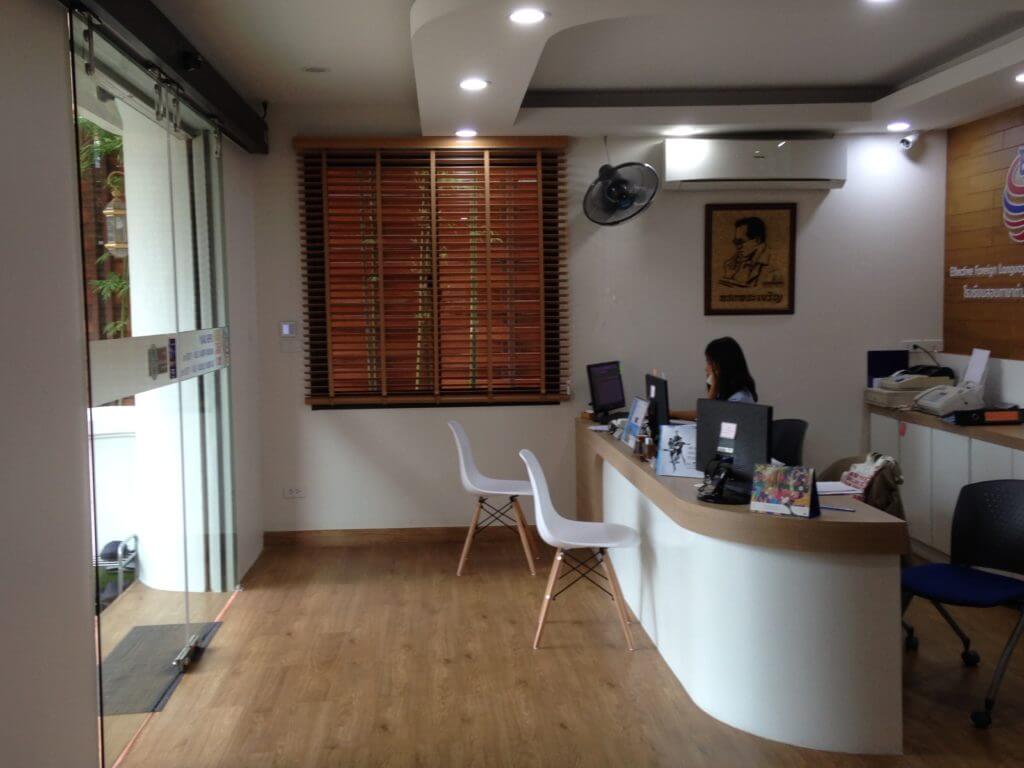
The entrance of the new school.
Interview with John Quinn
I met with John in his office and he was well-dressed and had the face of a kind and gentle father. He was very soft-spoken and put me at ease almost immediately. I could tell that he had been a TEFL teacher.
I promised him that I would only need his attention for about an hour but he gave me much more than that. John had his forays into traveling at an early age, right after college, when he traveled East. South East Asia was one of his first destinations although he hadn’t considered Thailand until visiting Malaysia and Myanmar and meeting some backpackers along the way who told him about Thailand.
This was back in the day when there were no smartphones, no couch-surfing, the days when you had to really travel by the seat of your pants and socialize with anyone who was willing to make eye contact with you and listen to your stories. This was also during a time when John was not a licensed teacher. Before his forays into teaching, he would just get odd jobs here and there to maintain his nomadic lifestyle, whether it was being hired by his brother for a few days or just living in a cave, as opposed to a hostel, which many travelers these days are more likely to do.
The nexus of John’s journey really took off when he visited Chiang Mai. The way he describes it, he said he had a “different feeling,” one that was presumably unlike any other that made him settle on Chiang Mai. But it was in his travels with these backpackers to Thailand where he first came across TEFL teachers and the idea of teaching for a living.
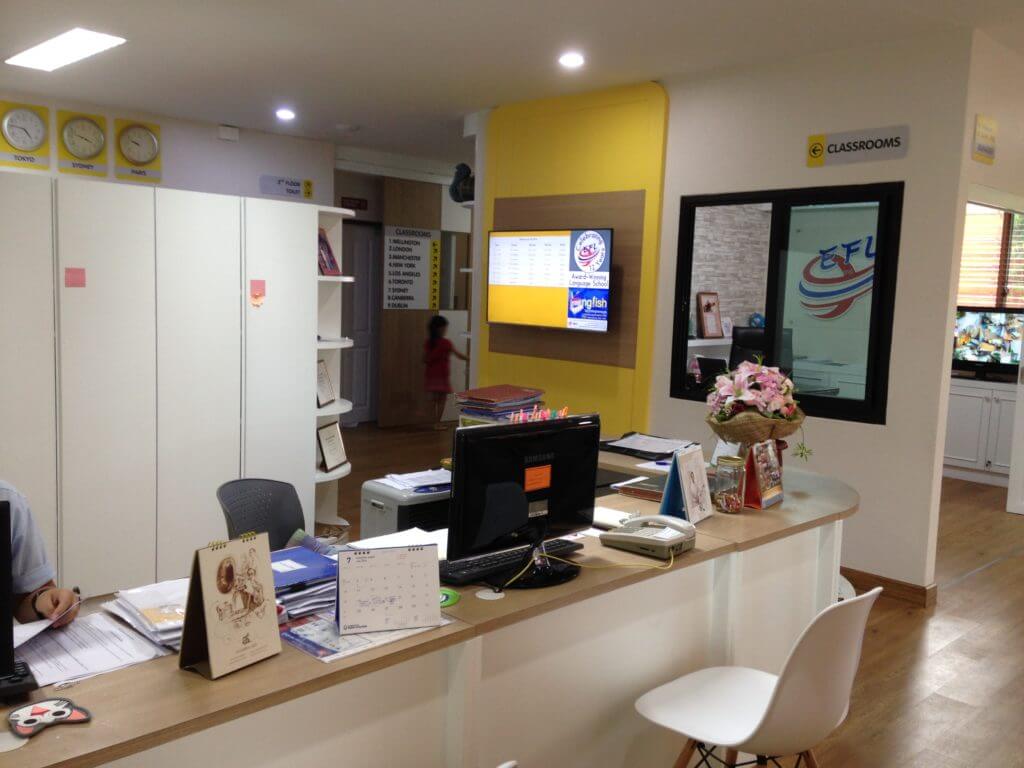
An office on the way to the classrooms.
When he got to Chiang Mai in the 90s, he said that he was able to secure a livable wage as a teacher, one where he could have his basic needs covered and still eat out five nights a week. Eventually, he met his wife and they founded a school for Teaching English as a Foreign Language. At the time, there was no evidence that a school for teaching English would be successful, especially since many of the more established schools were already supplying whatever demand there was in the area for learning how to teach another language.
Eventually, John triumphed over the competition and etched out his place in the industry, in Thailand, a country that he wasn’t even a citizen of.
It was during his days as a teacher that he really started getting into meditation and Buddhism, the country’s official religion and it was through these cultural and religious discoveries that he also improved his own teaching and realized a few critical insights about teachers that not everyone thinks about. It was these insights that I found so compelling, as I had never quite thought about teaching English in the way that John thinks of it.
Advice for New Teachers
One of my first questions was what sorts of mistakes he saw new teachers making in the profession. John’s response surprised me. He said that most teachers get to be too emotional, and their sense of time is different from their students. He said that Western people (i.e. people from English speaking countries such as the USA and the UK) tend to think of time as something that is tangible and that exists. He explained that from a traditional Thai person’s perspective nothing exists except for the present moment.
He added that many Westerners tend to get upset by things that they cannot control. He used the example of a dog barking and how the incessant barking sound could upset Westerners, but not so with Thai people. On the contrary, Thai people don’t get too consumed with the daily minutiae that they cannot change, such as a dog barking. Things are what they are.
As such, for many Thai people, Westerners may come across as overly emotional, to the point of acting immature. And it is here where many new teachers get into trouble. John said that if teachers get really angry with their students in Thailand, the students tend to lose respect because they think that overreacting of any kind by an authority figure makes them seem childish, almost like a baby.
This fascinated me because I had always been under the impression that teachers were authority figures and disciplinarians, both at the same time. John quickly corrected my view about this. He said that if you come into the room with a definite plan for your lesson, a sense of confidence, and a strong presence, the English language learners will follow you.

The hallways were immaculately clean! On the right are entrances to different classrooms.
Teachers as Entertainers vs. Disciplinarians
“Many teachers in South Korea feel like they need to be entertainers,” I interjected softly, almost as if I were confessing that I had felt this way sometimes. John confirmed that this view was sometimes held in Thailand as well. “Yes you have to make it fun,” he said, “but you are doing more than just entertaining. You have to teach english grammar,” he said. “You can’t learn a language without knowing the fundamentals of the grammar. Otherwise, you end up sounding like one of those tuk tuk drivers outside,” he said as he glanced toward the window where he might have been picturing a tuk tuk driver. “There are different facets of the language that you have to teach and be prepared for.”
I pressed John further. “What about disciplining the students?” “We have a class for that here,” he continued. “And in that class, we teach [the standards] for classroom managing, keeping a straight face and a stern look,” he said demonstrating. In truth, I had asked this question more for myself because I had never been as effective in this particular aspect of teaching.
“Look, if the students see that you’re unprepared or they sense that you don’t know what you are doing, then they know they have room to take advantage of that. You have to come in with an energy. The students can feel that energy and they work off of it when you’re teaching.”
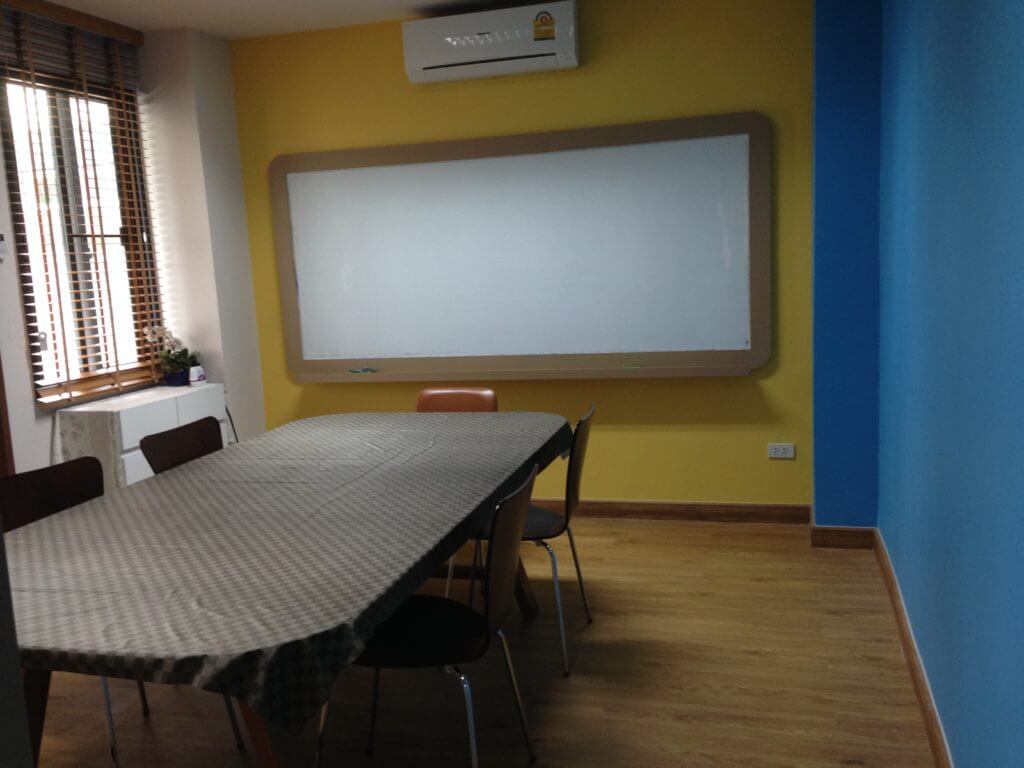
A classroom at SEE TEFL.
Making a Lasting Impact on Students
This was one of the most interesting lessons that I took away from the interview with John, this sense of being a master of energy building and energy manipulation. If you come in excited, for example, you can get the students excited and if you come in with a sense of wonder, then your students will also have that sense.
John pointed out that there are many credentialed teachers in the world, but some can be boring because they have no sense of excitement or wonder or ability to work with energy. It’s in this particular skill, John seemed to be saying, where the TEFL teacher really has an edge in the teaching industry overall. It is in this skill alone where TEFL teachers have the greatest impact and ability to leave a lasting impression on students the world over.
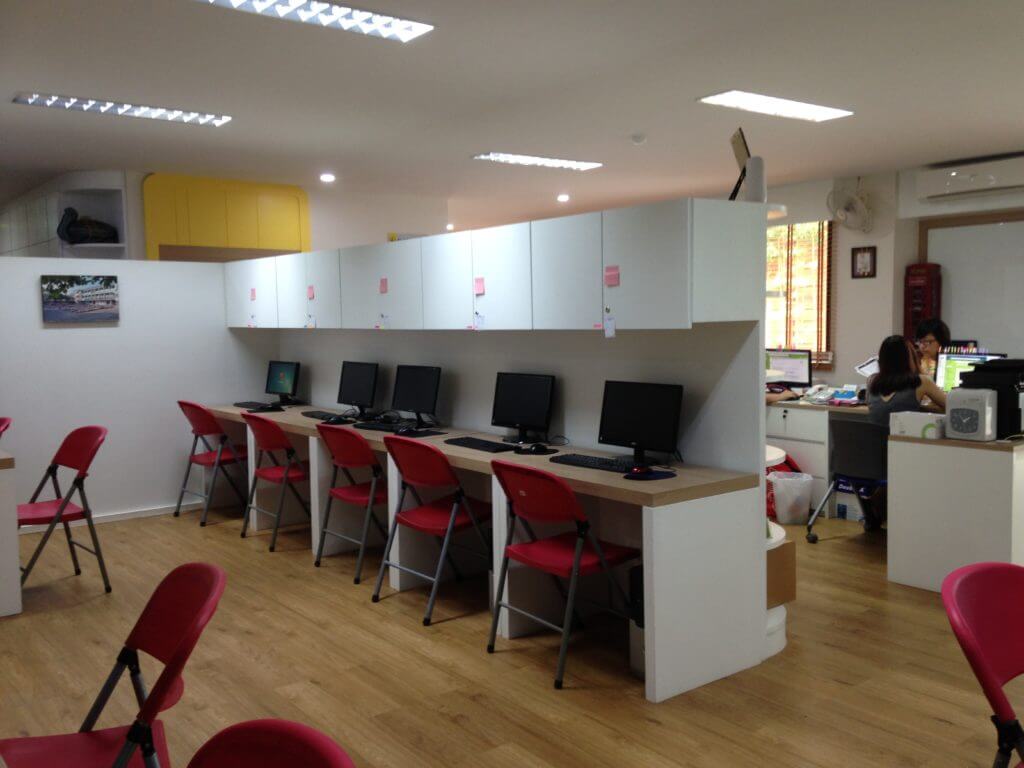
Teacher lesson prep area at SEE TEFL.
I was fortunate enough after the interview to be given a tour by John himself. The fact that John took the time out of his very busy day to do this was highly reflective of just the kind of humble and respectful guy that John Quinn is.
About the Author
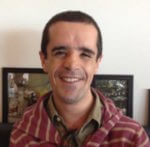
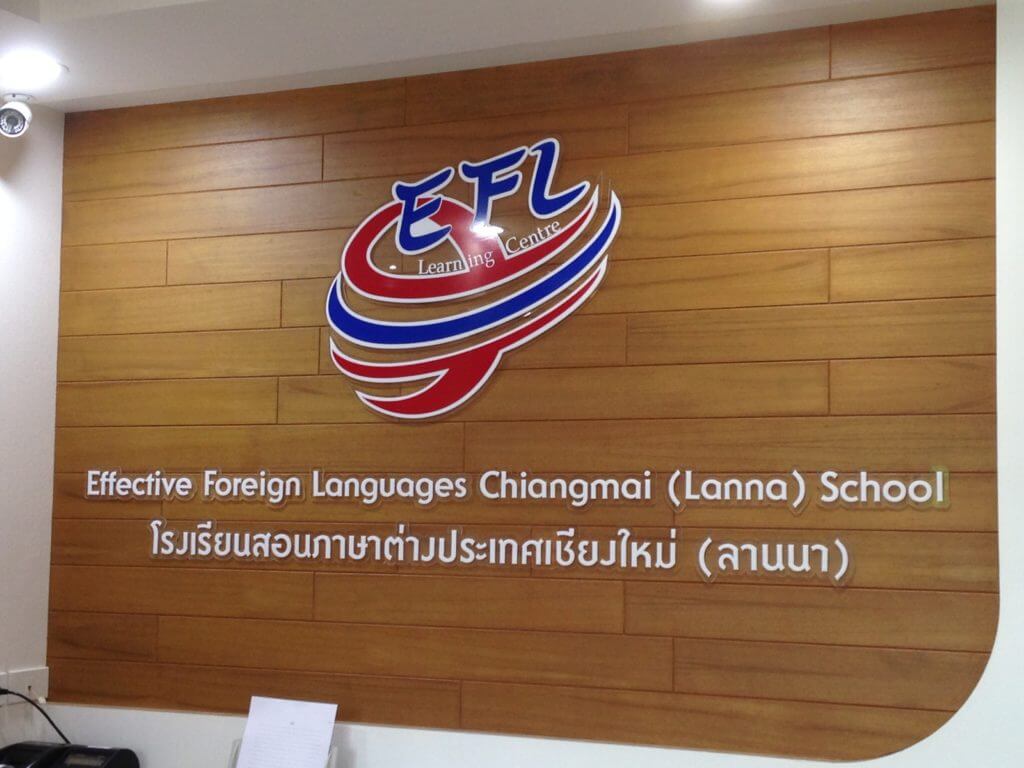
I love the idea of ignoring the things we cannot control. It is so true that it bugs too many people in the western world. I would love to teach in Thailand, maybe when I go I can 🙂
That is so true, Natasha. Something that I still have to remind myself of from time to time, even though we’ve been in Asia for over 6 years now. I’m sure you can teach in Thailand! 🙂